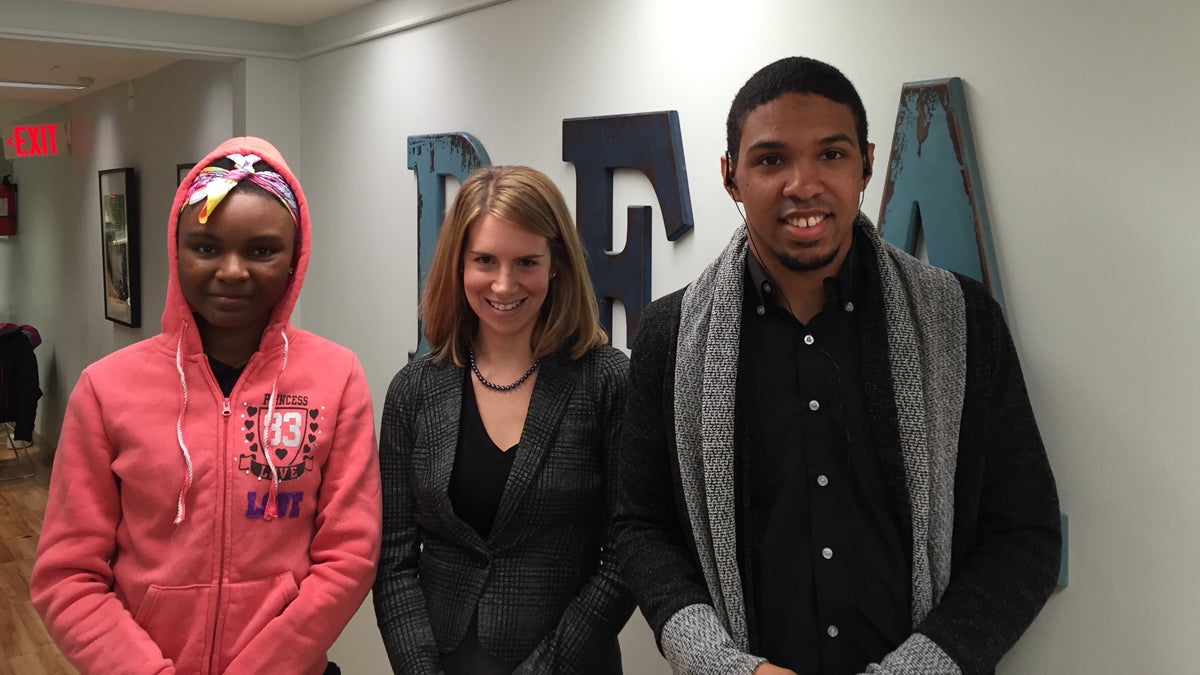Treating people with psychosis early, before their lives are derailed

Psychiatrist Irene Hurford (center) with two clients at 'PEACE', Shandese, 18, and Oberon, 20. (Maiken Scott/WHYY)
Some of the most severe mental illnesses such as schizophrenia or bipolar disorder tend to be accompanied by psychosis. People have visions, hear voices, or become paranoid.
Psychosis has a severe impact on people’s ability to live their lives, and it also affects cognitive abilities.
A Philadelphia program aims to intervene as early as possible – to help people experiencing psychosis stay on track in their lives.
During his first year in college, 20-year-old Oberon Wackwitz started to hear voices. They told him to cut himself. That he was worth nothing. Eventually, things got so bad, he ended up at a psychiatric hospital. It was not what he expected.
“It felt like being in a prison, they take your phone, they take your belongings, you have to wear hospital clothes,” he recalled.
He was also frightened by what he saw in the hallways and communal spaces. He was surrounded by people who were years into serious mental illnesses, talking to themselves or yelling.
“And it seemed like a lot of the people there were regulars, they were in and out, in and out,” said Wackwitz, who was terrified that this would be his life as well.
The hospital stay did help him, he said, because he might have committed suicide without it. But, overall, it was a terrible and frightening experience.
This is how many people who need help are introduced to the mental health field.
“Then, when he is discharged and says ‘I’m never going back there,’ then we talk about him being noncompliant, as though it’s his fault,” said psychiatrist Irene Hurford.
She heads a wrap-around program called PEACE — Psychosis Education, Assessment, Care, and Empowerment — where Wackwitz is now enrolled. The program, which serves Medicaid recipients, offers its clients talk therapy, regular sessions with a psychiatrist, art and music therapy — all in one place. The program also offers support with day-to-day activities.
“Because it’s a lot easier to stay in school, or to stay at a job, than to try and go back there after dropping out,” explained Hurford.
She works with patients to keep their medication doses as low as possible, to lower the impact of side effects such as severe fatigue or weight gain.
Hurford said the longer people experience untreated psychosis, the more damage happens in the brain, and the worse their outcomes are in terms of quality of life.
The program is about a year old now, and is getting steady referrals from Philadelphia hospitals.
Hurford said she is also doing a lot of outreach, to reduce the stigma attached to psychosis, and to get perhaps people into treatment even before they have a first serious psychotic break.
WHYY is your source for fact-based, in-depth journalism and information. As a nonprofit organization, we rely on financial support from readers like you. Please give today.





